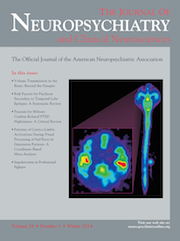Comparison of Cognitive Functioning Among Individuals With Treated Restless Legs Syndrome (RLS), Untreated RLS, and No RLS
Abstract
Restless legs syndrome (RLS) is a common neurological sensory-motor condition. High prevalence of comorbid depression and anxiety has been reported, but the few available data on the impact of RLS on cognition have been conflicting. The authors compared 91 participants (No-RLS group: N=37; Untreated RLS group: N=23; Treated RLS group: N=31) on cognitive performance and depression ratings. There were minimal observed group differences in cognitive performance, but the untreated RLS group had significantly higher depressive symptoms than the treated RLS and the no-RLS groups. RLS does not appear to affect cognition, but there does appear to be a strong association between untreated RLS and depression.



